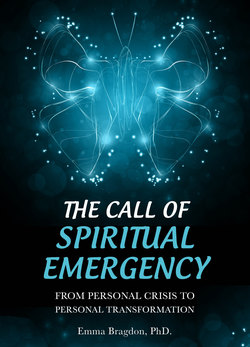Читать книгу The Call of Spiritual Emergency: From Personal Crisis to Personal Transformation - Emma Inc. Bragdon - Страница 11
На сайте Литреса книга снята с продажи.
The Positive Results of Spiritual Experience
ОглавлениеI believe the numbers indicate that it is natural to have spiritual experiences as part of human development. Clearly, a byproduct of these experiences is that they enhance creativity and compassion, the ability to relax and be at peace with oneself, and the desire to be of service to others. These qualities are all useful in maintaining and improving the quality of individual and collective life on this planet. Thus, the development of these qualities may be indicative of our evolutionary pattern.
Evidence of these positive results is described in research on people who have for a time been clinically dead and then come back to life—a near-death experience, people who have awakened spiritual energetic forces, kundalini, in their own body, cross-cultural studies of shamans, and highly creative individuals.3 Dr. Kenneth Ring recognized a pattern of change in behavior in the majority of people who had had near-death experiences. These resembled the results people also achieved from intense kundalini awakenings brought on spontaneously or by spiritual practices like meditation. He found that people usually have no increased fear of death, believe in the existence of higher force(s) that are unconditionally loving and compassionate, perceive the universality of all religions, become more spiritual and less identified with any specific religion, often acquire the ability to heal and other psychic abilities, and out of increased compassion seek to improve the quality of life of other people.
The creativity born of spiritual experiences is documented in the biographies of our inventors, musicians, writers, and artists. Puccini described the inspiration for his Madama Butterfly in the following way:
The music of this opera was dictated to me by God; I was merely instrumental in putting it on paper and communicating it to the public.4
Brahms described it this way:
When I feel the urge I begin by appealing directly to my Maker. . . . I immediately feel vibrations which thrill my whole being. . . . In this exalted state I see clearly what is obscure in my ordinary moods; then I feel capable of drawing inspiration from above as Beethoven did. . . . Those vibrations assume the form of distinct mental images.5
George Sand speaks of her writing thus:
The Wind plays my old harp as it lists. . . . It is the other who sings as he likes, well or ill, and when I try to think about it, I am afraid and tell myself that I am nothing, nothing at all.6
Inventors often speak of getting their inspiration from dreams or the hypnagogic state, a state of consciousness between dreaming and waking. Thus, the source of their inspiration comes from the resources of the higher unconscious. Albert Einstein received valuable information through a waking vision. When he was resting on top of a hill one day he imagined himself traveling to the sun and returning. The experience "felt" to him as if he had traveled in a curved line. This insight led to his developing his famous equation, "Energy is equal to mass times the speed of light squared." Sir Frederick Grant Banting found his laboratory procedure for the mass production of insulin in a dream state.
How is it, then, that we have for such a long time thought spiritual experiences to be indicators of madness, and messages from the unconscious to be primarily workings of repressed emotion? How could our psychologists and doctors have been so misinformed? The issue is not misinformation, but rather, whether individuals have the capacity to integrate the experiences into their daily lives. If an individual does not have the wherewithal within himself or the guidance he needs to accommodate intense spiritual experiences, such an experience may accelerate a disintegration of his mental health, just as any intense physical or emotional experience might likewise overwhelm him. This is the madness society fears. But if an individual has the capacity to integrate the spiritual experience into her ordinary day-to-day life, it enhances her life, giving her access to higher levels of human development beyond ego. This is called spiritual emergence.
